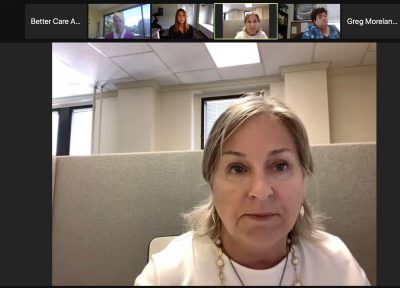Rep. Wild opened the conversation by emphasizing the importance of continuing to support local health care providers as we work to contain the COVID-19 Delta variant. She recognized Vicky Kistler, Director of the Allentown (PA) Bureau of Health, for her tireless efforts to address and contain COVID-19 locally, and said, “The best thing to do to beat this pandemic and save lives is to get as many people vaccinated as possible.”
Later in the discussion, Rep. Wild also shared the vital role played by home health care providers and the importance of a strong Medicare program to increase access to high quality care.
Mitch Vidovich, Vice President of Government Affairs at IBX, shared how the company has worked to improve patient access during the COVID-19 crisis and the steps they’ve taken to address social barriers to health. Vidovich noted that IBX has invested $200 million into COVID-19 response efforts, including a sponsorship with the Black Doctors COVID-19 Consortium and Latino Connection to help expand vaccination outreach and access to communities of color in Pennsylvania. He said, “We believe wholeheartedly that now is the time to transform our health care system to one that is affordable and equitable for everyone. The pandemic has really exacerbated the longstanding challenges in our health care system – the issues of access to care and racial disparities.”
Vicky Kistler of the Allentown Bureau of Health outlined several key reasons why individuals continue to remain unvaccinated: (1) they are afraid of the vaccine itself; (2) they fear adverse side effects to the vaccine will hamper their ability to work; (3) they view refusing the vaccine as a badge of honor; and/or (4) they have a number of access barriers (e.g., transportation, mobility, etc.).
“I’m surprised at how many people are misinformed about the vaccine,” said Kistler. “And how difficult it is to get adequate information to these people.” She discussed the need to continue working with community and health care providers to support COVID-19 education and resources to help address vaccine hesitancy. She also discussed how pervasive are the impacts of social barriers to health in the community, noting the need to ensure Pennsylvanians can access vaccines and care. Kistler said, “There is a lot of assistance out there for people that they don’t know how to get.”
Teri Henning, President & CEO of the Pennsylvania Homecare Association, highlighted how homecare agencies and professionals have met the challenge to provide quality care during the pandemic. She noted that home is often where people want to receive care and also where it’s more cost-efficient. Henning emphasized that the biggest crisis impacting the future of home health is addressing workforce needs and shortages. She added that expanding telehealth services, offering training flexibilities, and providing additional funding and support would go a long way to empowering the home health industry to become more proactive and better prepared for future outbreaks and pandemics.
Greg Moreland, Senior Director of the Pennsylvania Chapter of the National Federation of Independent Businesses (NFIB) shared that health care coverage and the cost associated with it remains a huge concern for small business owners. He shared that NFIB members continue to search for ways to offer affordable health care to employees. He said, “The more we can do to address social determinants of health, the better we can integrate care to drive down costs and provide quality care to our members.”
Rep. Wild concluded the roundtable by thanking everyone for the informative conversation and encouraging them to continue their efforts to address the social barriers impacting Pennsylvanian’s access to health care and COVID-19 vaccines.

